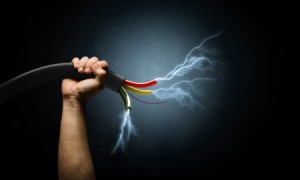Every year, the Electrical Safety Foundation International runs a month-long campaign in May to improve electrical safety in your community, organization, school or family. This year, the theme of National Electrical Awareness Month is “Decoding the National Electric Code (NEC) to Prevent Shock and Electrocution.”
Raising awareness about electrical safety in various settings is the first step to reducing electrical fires, injuries and – in the worst of cases – death. In fact, in the construction industry, electrocutions account for nearly 10 percent of all fatalities.
Though the most at-risk sector is construction, the ESFI encourages every workplace to be actively involved in the month-long campaign to increase safety around electricity. Whether you’re an employer or employee, part of your job should be to help promote safety in the workplace to ensure you – and your co-workers – are prepared in the event of a problem. According to the Occupational Safety and Health Administration, you should check to ensure existing work conditions meet all standards and compliance regulations as well as train your people to recognize potential electrical hazards.
Want to do your part to celebrate National Electrical Awareness Month? Follow these tips from OSHA:
- Assume that all overhead wires are energized at lethal voltages. Never assume that a wire is safe to touch even if it is down or appears to be insulated.
- Never touch a fallen overhead power line. Call the electric utility company to report fallen electrical lines.
- Stay at least 10 feet (3 meters) away from overhead wires during cleanup and other activities. If working at heights or handling long objects, survey the area before starting work for the presence of overhead wires.
- If an overhead wire falls across your vehicle while you are driving, stay inside the vehicle and continue to drive away from the line. If the engine stalls, do not leave your vehicle. Warn people not to touch the vehicle or the wire. Call or ask someone to call the local electric utility company and emergency services.
- Never operate electrical equipment while you are standing in water.
- Have a qualified electrician inspect electrical equipment that has gotten wet before energizing it.
- If working in damp locations, inspect electric cords and equipment to ensure that they are in good condition and free of defects, and use a ground-fault circuit interrupter (GFCI).
- Always use caution when working near electricity.
From our Lockout/Tagout Equipment to signs and identification products, Emedco has everything you need to improve electrical safety at all your facilities. Just give our team of professionals a call at (866) 748-5963 or visit Emedco.com to find safety solutions for every challenge.

